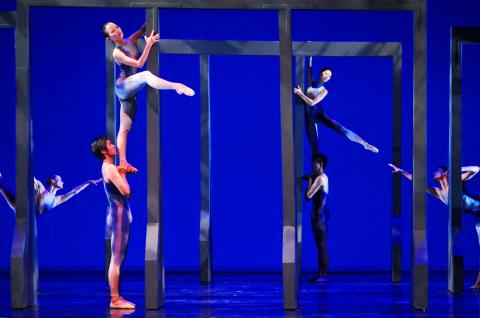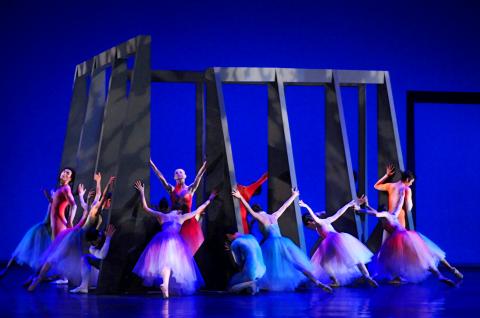It is not often that a local dance company gets to restage one of its original productions, a situation that reflects both market forces and the government’s cultural subsidy system. This is a great loss, both for audiences and a company’s performers because it robs them of a chance to revisit a work and have new dancers tackle the roles.
Building a repertoire is crucial for a company’s development and something that Tainan-born choreographer Allen Yu (余能盛) feels very strongly about.
“Taiwanese are always throwing things away ... you need a repertoire for dancers and the public. Some of my pieces are in the repertories [of companies] in Germany, the Czech Republic, but no other company keeps a repertoire in Taiwan outside of Cloud Gate [Dance Theater (雲門舞集)],” Yu said in a telephone interview last week.

Photo Courtesy of Sandy Ouyang
So Yu jumped at the chance to revise one of his works for the Tainan Municipal Cultural Center, which named Yu its first artistic director last year.
The center wanted him to do a big ballet this year, but he told them he did not have the time to create two new ballets, having organized the Museum Night, Opera Highlights (博物館之夜‧歌劇選粹) concerts in June for the Tainan Arts Festival and the Chimei Museum, which included two short dances.
So center officials picked Yu’s 2010 production, The Door (門), for the Chamber Ballet Taipei (台北室內芭蕾), which was renamed Formosa Ballet (福爾摩沙芭蕾舞團) last year.

Photo Courtesy of Sandy Ouyang
Yu said reviving The Door gave him a chance to “clean it up” and expand the cast to 30 dancers, including a larger contingent of males.
“It is one of my personal favorites of the about 30 big ballets that I have done so far,” he said. “I’m still not 100 percent satisfied, I can’t say that, but I’m happy. I really enjoy doing this piece.”
Yu brought back dancers Bogdan Canila and Cristina Dijmaru, soloists with the Bucharest National Opera Ballet who were so memorable in Yu’s 2013 Swan Lake, for the leading roles.
“Christine, she is great. She is younger than Nadja Saidakova from Deutsch Oper Berlin [who starred in the 2010 show], who was in her 40s, so I changed the choreography in the solo for her. Christine has beautiful technique, beautiful feet. She got married last year, I told her she is now different, really a woman,” Yu said.
One of the hallmarks of Yu’s productions is the use of live music. The Evergreen Symphony Orchestra (長榮交響樂團) will be led by German conductor Gernot Schmalfuss, but Yu warned that audiences this weekend will not enjoy the full effect of the music — Italian composer Nino Rota’s La Strada suite and Sergei Rachmaninoff’s Symphonic Dances — because the New Taipei City Arts Center’s theater is so small.
“With a double timpani and a piano, the space is so tight, so we had to go with a smaller, upright piano [instead of a grand piano]. However, the Hsinchu and Tainan theaters have more space,” Yu said. “I hope next year I can get a bigger place in Taipei to do a show.”
A two-act ballet, divided by both the extremely different scores and styles of choreography, The Door is about the doorways of our lives and what they lead to: jobs, love, tragedy, happiness. They serve as the turning points that frame our lives.
A collection of 12 large moveable door frames make up the starkly simple set, their strong clean lines providing a visual and a physical counterpoint to the dancers’ pliable bodies.
Performance notes
WHAT: The Door
WHEN: Tomorrow at 7:30pm, Sunday at 3pm
WHERE: New Taipei City Arts Center (新北市藝文中心演藝廳), 62 Jhuangjing Rd, Banciao District, New Taipei City (新北市板橋區莊敬路62號)
ADMISSION: NT$400 to NT$2,000; tickets available online at www.artsticket.com.tw, convenience store ticketing kiosks and at the door
ADDITIONAL PERFORMANCES: Tuesday at 7:30pm at the Performance Hall of the Hsinchu County Cultural Affairs Bureau (新竹縣文化局演藝廳), 146 Siancheng 9th Rd, Jhubei City, Hsinchu County (新竹縣竹北市縣政九路146號); Aug. 13 at 7:30pm at the Taichung Chungshan Hall (台中中山堂), 98 Hsuehshi Rd, Taichung City (台中市學士路98號); and Aug. 20 at 7:30 and Aug. 21 at 3pm at the Tainan Municipal Cultural Center (臺南文化中心演藝廳), 332, Chunghua East Rd Sec 3, Greater Tainan (臺南市中華東路3段332號). Ticket prices and purchase points as above.

Towering high above Taiwan’s capital city at 508 meters, Taipei 101 dominates the skyline. The earthquake-proof skyscraper of steel and glass has captured the imagination of professional rock climber Alex Honnold for more than a decade. Tomorrow morning, he will climb it in his signature free solo style — without ropes or protective equipment. And Netflix will broadcast it — live. The event’s announcement has drawn both excitement and trepidation, as well as some concerns over the ethical implications of attempting such a high-risk endeavor on live broadcast. Many have questioned Honnold’s desire to continues his free-solo climbs now that he’s a

As Taiwan’s second most populous city, Taichung looms large in the electoral map. Taiwanese political commentators describe it — along with neighboring Changhua County — as Taiwan’s “swing states” (搖擺州), which is a curious direct borrowing from American election terminology. In the early post-Martial Law era, Taichung was referred to as a “desert of democracy” because while the Democratic Progressive Party (DPP) was winning elections in the north and south, Taichung remained staunchly loyal to the Chinese Nationalist Party (KMT). That changed over time, but in both Changhua and Taichung, the DPP still suffers from a “one-term curse,” with the

Jan. 26 to Feb. 1 Nearly 90 years after it was last recorded, the Basay language was taught in a classroom for the first time in September last year. Over the following three months, students learned its sounds along with the customs and folktales of the Ketagalan people, who once spoke it across northern Taiwan. Although each Ketagalan settlement had its own language, Basay functioned as a common trade language. By the late 19th century, it had largely fallen out of daily use as speakers shifted to Hoklo (commonly known as Taiwanese), surviving only in fragments remembered by the elderly. In

Lines between cop and criminal get murky in Joe Carnahan’s The Rip, a crime thriller set across one foggy Miami night, starring Matt Damon and Ben Affleck. Damon and Affleck, of course, are so closely associated with Boston — most recently they produced the 2024 heist movie The Instigators there — that a detour to South Florida puts them, a little awkwardly, in an entirely different movie landscape. This is Miami Vice territory or Elmore Leonard Land, not Southie or The Town. In The Rip, they play Miami narcotics officers who come upon a cartel stash house that Lt. Dane Dumars (Damon)